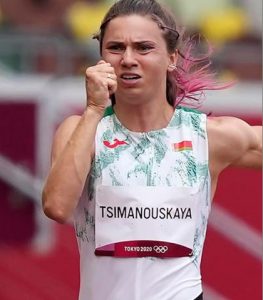Seeking asylum at the Olympics
Belarusian sprinter Krystsina Tsimanouskaya is the latest athlete to seek asylum and protection while competing at an Olympics.
The runner refused to return to Belarus from the Tokyo 2020 Olympic Games and has sought diplomatic protection
 Ms Tsimanouskaya dodged an attempt to forcibly repatriate her from the Games by approaching police and seeking refuge in Tokyo’s Haneda airport.
Ms Tsimanouskaya dodged an attempt to forcibly repatriate her from the Games by approaching police and seeking refuge in Tokyo’s Haneda airport.
Her case has focused attention on political discord in Belarus, where authorities have cracked down on dissent following a wave of protests following the disputed August 2020 election the opposition claims was rigged to keep long time President Alexander Lukashenko in power.
Ms Tsimanouskaya was offered a humanitarian visa from Poland although she later flew to the Austrian capital of Vienna.
She is the latest in a long line of athletes seeking asylum at games and other large international sporting events.
Athletes seeking asylum at international sporting events is not rare; it has happened at nearly every Olympic Games since World War II, with Western host nations – who have generally a more open approach to people seeking asylum – usually receive more claims.
Many athletes defected from the Eastern Bloc during the Cold War, including around half of Hungary’s Olympic team at Melbourne’s 1956 games after learning of the Soviet Union’s brutal invasion of Hungary upon landing.
More than a hundred athletes defected from the 1972 Munich Games in what was then West Germany.
The nationalities of athletes seeking asylum have shifted over time.
During the Sydney 2000 Games, 145 people from various countries overstayed visas, 35 of whom applied for political asylum and 62 of whom were classified as missing.
A total of 82 athletes and officials sought asylum in the UK when London hosted the Games in 2012, some before the opening ceremony had even started. 52 were eventually granted refugee status.
Many athletes, including from countries such Eritrea, Sudan, Guinea and Rwanda, simply vanished from the London Games before being found or later presenting themselves to formally claim asylum.
The group included seven athletes from Cameroon representing the African nation’s entire boxing team, , one of whom had already sought refuge in China during the 2008 Beijing Games.
Marie Provaznikova, a Czechoslovakian gymnastics coach, was reportedly the first to seek asylum at a modern Olympics. This was in London during the post-war 1948 Games.
It’s not just Olympic game that have seen asylum claims.
Around 200 athletes and officials requested sanctuary in Australia when it hosted the Commonwealth Games in 2018. Twenty 21 people sought asylum in Glasgow four years earlier and 45 in Melbourne in 2006.
At least 200 Ghanaian soccer fans sought asylum in Brazil when the country hosted the World Cup in 2014 and Eritrean soccer players—sometimes large numbers from the national team – have repeatedly sought asylum from their nation’s brutal military regime while competing abroad.
In some countries, sport is a rare opportunity to travel abroad and some countries, like North Korea, take extreme measures to stop their athletes disappearing.
Currently there are 29 athletes are competing in the Refugee Olympic Team in Tokyo 2020.
The International Olympic Committee created the team for the 2016 Games in Rio de Janeiro to allow athletes to keep competing if forced from their home countries. The athletes come from Syria, the Democratic Republic of Congo, South Sudan, Eritrea, Venezuela, Iran, Afghanistan, and Cameroon. Ten athletes competed under the banner in Rio.












